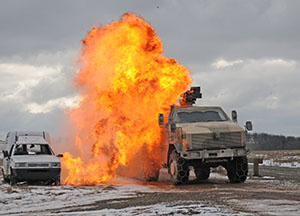
BAUMHOLDER, Germany — When the heat and flames from an explosion caused by a simulated improvised explosive device blast rocked their Dingo, German soldiers reacted quickly, speeding through the kill zone to safety.
The scenario was part of a counter IED and convoy live fire exercise Feb. 20 here. The 421st Multifunctional Medical Battalion hosted their German partner unit, the 950th Operation Information Battalion.
“When you get an IED going off next to you, it’s very important to stay focused,” said German Lt. Torben Anders.
The Germans’ Dingo, a vehicle similar to the U.S. Mine Resistant Ambush Protected vehicle, was among many German and U.S. vehicles used. The 421st MMB, a subordinate unit of the Sembach-based 30th Medical Command, provided Humvees, a few drivers, simulated casualties and an opposing force. German Polizei provided pyrotechnics with guidance from a Joint Multinational Training Center Counter IED expert.
U.S. Army Staff Sgt. April Riddle, a native of Flint, Mich., normally works as a 421st food inspector. During the training, she played a village elder.
“We’re all working for one cause,” Riddle said. “We fight together, so why not train together?”
Roughly 60 German troops took part in the training. As many have yet to deploy downrange, their leaders understand the importance of these exercise
scenarios beforehand.
“These training drills, that’s what keeps our guys alive. If it comes to an IED, you can never prepare soldiers too much,” said German Capt. Tim Hoersch, a platoon leader from the 6th Company, 950th Operation Information Battalion, who returned from an Afghanistan deployment a month ago. “Training, training, training. Harder, faster, more often,” Hoersch said. “That’s what it’s all about.”
The 421st often conducts multinational training. In the last eight months, the battalion trained with Lithuanians, Slovenians and Africans.
For the past four months, they have held several events with the 950th Battalion.
Spc. Jvonte Guthery, a 64th Medical Detachment food inspector, served as a convoy driver. Guthery found that German and U.S. troops have a lot in common.
“They’re just like us really. We’ve basically been having fun training. We’re with each other from sun up to sun down,” he said. “When we go downrange, it’s not just us — it’s all of us. One team, one fight.”







